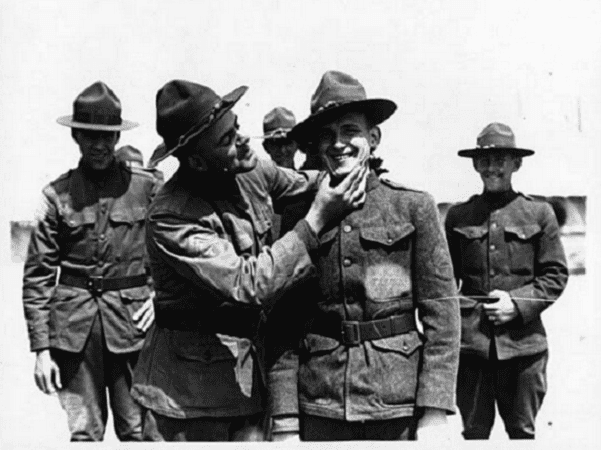Introduction: In this article – to celebrate the centennial of the end of WWI this Sunday – Gena Philibert-Ortega gives tips for using Honor Rolls to help with your family history research. Gena is a genealogist and author of the book “From the Family Kitchen.”
What did your ancestors do during World War I? Military records document our military-serving ancestors, but remember that during war time everyone helped in some way – from those who served on the battlefields to those on the home front who worked in factories or volunteered for activities like food conservation and knitting.

Honor rolls found in various formats, such as newspapers, books, and plaques, can help provide us with information about our ancestors and their community during the war – and may lead to some surprising discoveries.
Honor Rolls
When I think of an “honor roll” I think of something that documents and honors those who have either served or who died serving in a war. After World War I, efforts to honor those who served their country were made. In some cases, the honoring of the soldier was done individually via a letter to the returning soldier or the deceased soldier’s family. This 1918 newspaper article explains this effort:
“That each local community maintain an honor roll regarding the names of all men in service with their achievements and dates of entry and discharge.”

Historical newspapers have many examples of World War I honor rolls being prepared for publication. These rolls include everything from the soldier’s name to a photograph of those who died in active service – as well as those who died prior to deployment. While most of these honor rolls mention “men” they also include women (women served during World War I as nurses and switchboard operators). Here’s an example of an honor roll being prepared for those “university men” from the University of Kansas who had died.
Honor Rolls and Family History
For the family historian, finding these honor rolls may be challenging. Some honor rolls may have survived in published books, while others may be memorialized on bronze plaques.
Some of these honor rolls may have a more ephemeral quality – like the framed parchment paper honor rolls I saw recently stored in a Canadian archive.
Searching for Honor Rolls
To begin your search, seek out books that commemorate what your ancestors’ community did during the war. In some cases, these honor roll books documented the efforts of an entire county (including those on the home front) and are found in published volumes available via digitized book websites and in libraries.
For example, searching on the digitized book website Hathi Trust for the phrase “Honor roll of” and the name of the county you’re interested in will reveal publications such as the following:
- The Honor Roll of Livingston County, Michigan
- The Honor Roll of Gibson County, Tennessee
- The Honor Roll of Green Lake and Waushara Counties, Wisconsin
- An Honor roll containing a pictorial record of the gallant and courageous men from Freeborn County, Minnesota
- An Honor roll containing a pictorial record of the loyal and patriotic men from Whitman County, Washington
Local repositories might also have copies of these honor roll books in their collection, or have digitized and made them available online, such as the Honor Roll of Greene County, Missouri available on the Missouri Over There website, which commemorates the state of Missouri in the Great War. The honor roll books for Howell and Lawrence Counties are also available on this website.
Keep in mind that although these are wonderful resources for World War I soldiers, they also provide photos and names of women on the home and the battle fronts. My favorite is this image of Mary Denton, who was the “champion knitter” because she had knitted over 800 garments for the Red Cross. (1) What a wonderful find for a descendant of Mary’s!
You Can Help Make Honor Rolls Available
While finding honor rolls with the name or image of an ancestor is important for our family history research, preserving them for generations to come is equally important. Consider looking for honor roll plaques where you live and uploading the image and transcription to the Honor Roll Project founded by genealogist Heather Wilkinson Rojo. You can learn more about the project and see information already uploaded at the project’s website. You can also read more about contributing to the project on her blog, Nutfield Genealogy.
___________________
(1) Special thanks to the Green County Archives and Records Center who posted about this book on their Facebook page.
